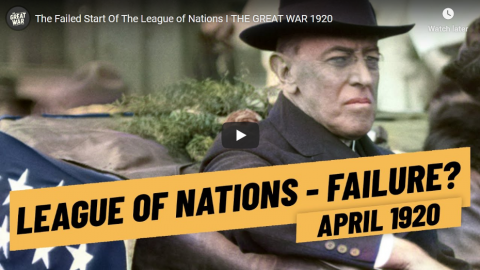World War Two
Published 11 Apr 2020This week, the German army invades Greece and Yugoslavia as it launches Operation Marita and Operation 25 respectively. They also take some remarkable captives in North Africa.
Join us on Patreon: https://www.patreon.com/TimeGhostHistory
Or join The TimeGhost Army directly at: https://timeghost.tvFollow WW2 day by day on Instagram @World_war_two_realtime https://www.instagram.com/world_war_t…
Between 2 Wars: https://www.youtube.com/playlist?list…
Source list: http://bit.ly/WW2sourcesWritten and Hosted by: Indy Neidell
Produced and Directed by: Spartacus Olsson and Astrid Deinhard
Executive Producers: Bodo Rittenauer, Astrid Deinhard, Indy Neidell, Spartacus Olsson
Creative Producer: Joram Appel
Post-Production Director: Wieke Kapteijns
Research by: Indy Neidell
Edited by: Iryna Dulka
Map animations: Eastory (https://www.youtube.com/c/eastory)Colorizations by:
– Olga Shirnina, a.k.a. Klimbim – https://klimbim2014.wordpress.com/
– Daniel Weiss
– Julius Jääskeläinen – https://www.facebook.com/JJcolorization/
– Adrien Fillon – https://www.instagram.com/adrien.colo…
– Carlos Ortega Pereira, BlauColorizations
– Owen Robinson – https://www.instagram.com/owen.colori…Sources:
– FORTEPAN / MARTIN DJEMIL, MARTIN DJEMIL
– FDR Presidential Library & Museum
– Bundesarchiv
– Narodowe Archiwum Cyfrowe
– Side cap and veteran icons by Andrei Yushchenko from the Noun Project
– IWM: E 2961, E 4702, E 2987, A 9796Archive by Screenocean/Reuters https://www.screenocean.com.
A TimeGhost chronological documentary produced by OnLion Entertainment GmbH.
From the comments:
World War Two
2 days ago
This is the second double-length episode, with the Invasion of the Benelux and France being the first one (May 18th 1940). Now, there are two things I want to point out in this comment. First of all, like our May 18th episode, this episode is packed with the amazing maps made by Eastory. If you haven’t already, subscribe to www.youtube.com/c/eastory. Furthermore, this week the final episode of our Between Two Wars series aired, covering the world on the brink of World War Two. The entire series of 58 episodes long, covering all the events leading up to WW2, can be watched in this playlist (https://www.youtube.com/playlist?list=PLrG5J-K5AYAU1R-HeWSfY2D1jy_sEssNG) or simply by going to www.youtube.com/c/timeghost.
Cheers, Joram








